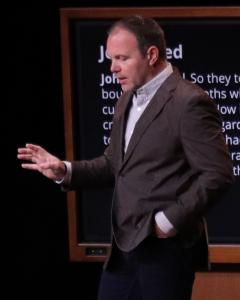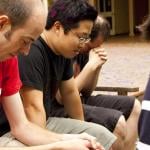I became an evangelical Christian at the age of 34 while serving in the Army. My conversion took place at a non-denominational church in a southwest suburb of Chicago. It was there that I had a direct experience of Jesus Christ– a true religious experience. That was March of 2010.
Shortly thereafter, I became aware of “Evangelical” Christianity. Growing up Roman Catholic on the south-side of Chicago, I knew of Lutherans, Baptists, Methodists and Presbyterians. I was at least familiar with the terms, even if I knew very little about what they referred to or to whom they referred. To me they simply meant not Catholic (in my then naive Roman Catholic view of catholicity). However, I was entirely ignorant of what an Evangelical Christian was and, as far as I can recall, never heard the term until I became one.
In addition, I only knew a few people personally who we Catholics called “Protestants.” The term “evangelical” was that foreign to my world, and I knew no one who could explain it to me. My only encounter with a similar term prior to my conversion occurred while living in Germany. There I encountered the German word “evangelisch,” which simply means Protestant (usually Lutheran) in German. The only public Protestant figure I had heard of growing up was Billy Graham, and I knew very little about him. There was a long time growing up when I even thought Billy Graham was a professional wrestler (which, it turns out, he was).
My Experiences With Mars Hill Church
So upon my conversion at the age of 34 I discovered for the first time the wider Christian world of American Evangelicalism. For Catholics who convert later in life to Protestantism this can be, on the one hand, like a welcome smorgasbord of options. On the other, it can be a confusing potpourri of denominational distinctives in both belief and practice. Initially, once converted, one doesn’t know how to identify oneself. One only knows one is in love with Jesus and that tends to suffice.
In spite of this confusion, I found an excellent, and still much beloved, local church in Fayetteville, North Carolina, where I was stationed at the time. To supplement my newfound life of faith, I began listening to online sermons and podcasts by evangelical “greats” like John Piper, Tim Keller, R.C. Sproul and, at that time, Mark Driscoll. Driscoll was very popular among military men who were also evangelical Christians. Plus, it seemed as if he was connected to these other older pastors, especially Piper, in a type of mentor-mentee relationship.
But when it came down to it I and many of my brothers in arms loved listening to Driscoll’s sermons the most. For me, having grown up in a tepid Roman Catholic culture, where the Gospel was static, stale and seemingly devoid of power, Driscoll’s dynamic preaching was refreshing. The constant focus on the person of Jesus in all of Driscoll’s sermons was, for a very new believer, potent and gratifying. It took no effort to listen to the 60+ minute sermons Driscoll would spin out every Sunday.
Driscoll, as I think all will admit, even those who suffered under his leadership, was one of the boldest and most unconventional of those Reformed preachers. During my time in the Army we took two trips to Seattle. Both times we visited the Mars Hill Church in Bellevue and enjoyed the services and the fellowship afterward. I even wrote a letter of testimony for the Mars Hill website about how Pastor Mark’s sermons had strengthened me while serving in Afghanistan. And, it is as true today as it was then.
A Short Excursus on Afghanistan
It is worth mentioning something about the aforementioned sermon here.
Driscoll had once preached a sermon about seeing our enemies not as actual enemies but as non-believers possessed by the powers and principalities Paul mentions in Ephesians 6. That sermon, derived from Ephesians 6:12ff, allowed me to see the Taliban I was fighting in Afghanistan in a very different light. It helped me to see these brutal foes not as enemies in the flesh but as children of God who needed liberation from the dark forces that controlled them (and that once controlled me).
In turn, this allowed me a certain kind of emotional and psychological distance from the evil of my enemy, a distancing that enabled me to separate the individual Taliban from his cruel deeds. It allowed me to love my enemy regardless of what they were doing, as I did not see them as the direct cause of their actions. Or, at least, I did not see them as the sufficient cause of what they were doing. This is no small thing and it shows that the power of the Gospel is not contained in the faulty vessel that is the preacher. The power is in the Gospel itself.
After the Army, I moved my small family out to Orange County, CA to attend a seminary that specialized in Christian Apologetics. At that time there was a local Mars Hill in Huntington Beach, CA. We attended that location for just a few months, and then the whole thing collapsed. Our experiences of Mars Hill were mainly positive and most of the abuse that occurred we heard about only second, third or even fourth-hand. We were very much on the periphery of the Mars Hill culture, the whole thing falling apart before we could get involved in any meaningful way. I suppose we were lucky.
I never met Mark Driscoll and only knew a few of the local pastors for a short time. When Driscoll resigned the local pastor for Orange County, a fine young man, decided to close shop in Huntington Beach and move on with his own ministry. We followed him and part of the congregation for a few months but then drifted to another church (Saddleback actually). That was the extent of my direct involvement with Mars Hill.
I didn’t follow much of the commentary about Mars Hill’s “fall” given the fact our affiliation was so thin. Before Driscoll’s resignation the only allegations I saw came mainly through a blogger named Warren Throckmorton. The allegations Throckmorton posted didn’t seem all that egregious to me at the time, especially as they were quite vague. But clearly there was much more going on behind the scenes and beneath the surface. For me though, that brief stint with Mars Hill and Mark Driscoll was simply over and I thought there would be nothing more to see here.
The Rise and Fall of Mars Hill Podcast
Recently, however, Christianity Today has produced a highly acclaimed podcast series “The Rise and Fall of Mars Hill” (RFMH). This podcast is getting an incredible amount of Christian “press,” and it is hard for me not to revisit those few years of tentative association with Mars Hill. But that is not the goal of this article. Instead, my aim here is to think carefully about the Christianity Today podcast itself and ask a few questions about the moral value of such an endeavor.
Before that, however, let me clearly state: I do not intend, in any way, to excuse the abuses that occurred at Mars Hill Church under the leadership of Mark Driscoll. I am not an apologist for Mark Driscoll, Mars Hill Church or any particular embodiment of the church, regardless of how much I appreciated Driscoll’s sermons or the time we spent in Huntington Beach. Unfortunately, I suspect, given what will now follow that my detractors will accuse me of just this: of defending Mark Driscoll. But I say again, I am not doing that.
I should also point out I have not listened to the entirety of the Christianity Today podcast. I am only considering what I know from listening to episode 1: “Who Killed Mars Hill?” However, this should be sufficient given the conversation with the producers and journalists that comes at the end of that first show. I do not know if I will listen to the rest. This article is part of that deliberation. If I do not it is certainly not out of a lack of interest. However, if my concern is valid, then there is another, more earnest, reason to skip the podcast. That reason is to avoid participating in what may be a sinful act.
Therefore, having listened only to episode 1, and considering the nature of such an endeavor more broadly, I want to ask three important theological questions:
- When is it appropriate to make publicly known the sins and moral failures of others?
- Who should be responsible for doing that? And, if there are people who should be the ones to make sins public, are there people who should not be the ones to make sins public?
- How do we gauge our own motivations for exposing another person’s sins and does the format in which we make those sins public matter?
To reiterate, in bringing up these questions I am not excusing what happened at Mars Hill under Mark Driscoll’s pastorate. It seems there is little doubt that Driscoll’s own sins should have been made public much earlier, that it should have been done by those around him and that the motivation should have been to significantly reform that church. However, because this did not happen then, does it mean that what Christianity Today is doing with their podcast now is morally and spiritually okay?
That is a different question that needs to be addressed. Anyone who has been a Christian for a minute, or who has studied church history with any seriousness, knows that there always has been and always will be local churches like Mars Hill. In fact, much of church history has been far worse than anything done by Mark Driscoll or Mars Hill Church in Seattle, Washington.
Moreover, biblically speaking, the author of Revelation–let’s call him John–makes it clear from the outset of the book that abuse in the local church will be a permanent reality until Jesus returns. In the first chapters, John encounters the living Christ. Here, the first thing Christ reveals to John is His criticism of the moral failures of some local churches of John’s day.
If God literally speaks to one of His inspired authors about the issue of abuse in the local church, then we shouldn’t be too surprised that a phenomenon like Mars Hill can occur. In fact, we should expect it to occur with every new generation of believers (regardless of place or culture), although we won’t tolerate it.

The Little Known, But Often Practiced, Sin of Detraction
Before addressing the three questions above, however, I need to clarify that I am framing this entire meditation through the lens of a very particular concern. That concern is this: given our current level and type of technology, and the instant-celebrity culture we live in, especially in America, are we susceptible to what has been called the sin of detraction. And, if so, then is something like “The Rise and Fall of Mars Hill” podcast a potential manifestation of that sin?
What is the sin of detraction? “Detraction” is not a well-known term, let alone a moral failure oft discussed in evangelical churches. While detraction could be equated with “gossip,” which is mentioned explicitly in the Bible as a mortal sin (Romans 1:29-32, 1 Tim. 5:12-13, several Proverbs), the way the term “gossip” is used today tends to soften the seriousness with which it is treated in the Bible.
Sure, no one thinks gossip is actually a good thing. But rarely do we equate it with something as horrific as murder or as something that warrants death, let alone eternal death (Romans 1:28-32). Normally we think of it as little more than “coffee klatsch.” But this is far from the biblical view. As such, I will tap into some Roman Catholic moral theology to make the point about why I suspect a podcast like RFMH might border on the genuinely sinful.
Before defining detraction we might define a related and more easily understood sin: calumny. Calumny is, for all intents and purposes, what we today call slander, or libel if in written form. Calumny is lying about another person for the sake of destroying their good name. It is lying in order to smear someone’s character and, usually, to benefit personally from that smear.
Detraction, on the other hand, is telling the truth about someone but for the wrong reasons. Detraction is the unwarranted exposure of someone else’s actual moral shortcomings for unjustified reasons or purposes. Detraction, like calumny, intends to smear someone’s name. But unlike calumny, it does so by exposing another’s “deep, dark secrets.” The secrets are nevertheless true ones.
An example of calumny is making up a story about a rival political opponent committing adultery when no adultery actually occurred. The liar in this case will usually time the lie in such a way that its effect is optimal, like right before a mid-term election. Calumny can, with much effort, be redressed as counter-evidence is produced to offset the falsehood. That is why the timing of the calumnious lie is so important, because the liar knows that the lie can eventually be undone. However, if the lie is enough of a “bombshell,” the damage caused can succeed in getting the liar what she wants even if it is later discovered that the bomb was a dud all along. People have short memories after all, especially in 2022.
An example of detraction, alternatively, is telling a true story about a rival political opponent who did commit adultery. However, in this case, the politician who cheated on his wife, say 15 years ago, has also genuinely repented and restored the relationship to his wife. He has lived faithfully and happily with her for going on 14 years now. The former sin has already been dealt with by the appropriate parties, at the appropriate time and in the appropriate way. It is only now brought forth again because a rival wants that particular truth about his opponent to be known publicly. But he wants that truth about his opponent to be known for his own ulterior motives, like gaining the popularity he needs to win the upcoming election.
This example could be amended to fit many other contexts, like in business, in sports and entertainment as well as in the church (just think of two men vying for the same pastorate as opposed to vying for political office). I only use the example of politicians because that is where we tend to see the sin of detraction most frequently. In the political world, detraction is often referred to as “opposition research.” A very sanitized term for a very evil practice.
What makes detraction more egregious than calumny is that it is almost impossible to offset, counteract or redress. Because it is true, there is no counter evidence to produce that can overturn it. One must admit it otherwise one is himself caught in a lie. Responding to detraction can be especially hard if the person who performed the sin in question is also trying to protect others who were involved in the tragic events. In the case of the adulterous politician this could be the now happy wife of the politician, the former mistress who perhaps is now also happily married or any children who might have been involved in the history of the affair.
In an increasingly graceless culture, the sin of detraction becomes the primary, non-physical weapon in destroying a rival. As one Roman Catholic theologian put it, committing the sin of detraction is like throwing a bag of feathers into the wind and then telling the accused to collect them all up again. It simply cannot be done.
The Need for Wisdom in Revealing Evil
Detraction is the sin of our times. It permeates the cultural waters in which we swim. We are up to our necks in the unjustified and unwarranted exposure of other people’s moral failures. We play off of detraction and feed off of it like ravenous wolves. It satiates our hunger for sensation and is the most expedient way for making ourselves feel better about ourselves. It is the primary means for many to get their social media thrills or “get ahead” in culture, and it often lands us in court with unfounded claims of “abuse.”
The most hideous thing about detraction is it absolutely nullifies grace. The kind of grace that is central to the Gospel of Jesus Christ.
This raises many difficulties, especially the ones mentioned above: when sins should be exposed, who should do the exposing and how that exposing should be done. For clearly we cannot go to the opposite extreme, one too familiar to us, of covering up or hiding that which must be revealed. Paul is explicit on this issue of revealing evil:
Have nothing to do with the fruitless deeds of darkness, but rather expose them.
Ephesians 5:11
So, as is often the case, the Bible assumes two universal, moral truths that, when taken together, present us with a dilemma: the evil of detraction (or gossip) and the evil of covering up evil. It is a dilemma that only wisdom can resolve, wisdom and love that is. What we are called to do then as Christians saved by grace is not just expose evil but to expose evil in a righteous way.
Revealing Sin: The When of RFMH
Does Michael Cosper and Eirk Petrik’s RFMH podcast use wisdom in their exposure of Mark Driscoll’s sins and the sins of others involved in Mars Hill Church? I cannot say for sure, but I have my concerns. Many of the events discussed in this podcast commentary are only a decade old, or even younger. The podcast title alludes to Edward Gibbon’s magisterial work on the fall of Rome. However, Gibbon wrote his (in the end very flawed) analysis 1300+ years after the events in question. Many of the events that the RFMH podcast touches on are only 7 or 8 years in the past. Shouldn’t this raise some red flags for us?
Regarding timing, one has to take into account the fact that Mark Driscoll is still alive, that his wife, Grace, is still alive, that his children are alive and, albeit now older, still his children. Further, it seems his wife still supports him in his current ministry and, I assume, his children as well. I assume there are grandparents, aunts and uncles involved as well.
This all has to be accounted for, since not all of these intimate associates are equally culpable for Driscoll’s actions. They may be less responsible parties that instead need protection, a protection that the podcast may indirectly cause to evaporate. The podcasters hopefully took into account they are going after some child’s “daddy” in airing his dirty laundry (and it is “dirty”) for potentially millions of others to see. How many might go after Driscoll’s children based upon what they hear on the RFMH podcast? It is hard to say in a graceless society.
The fact that the Driscolls are still with us should matter to whether this podcast should have been made now. Especially given that Mars Hill Church no longer exists and Driscoll has lost that platform. Of course, it doesn’t help Driscoll that he has started another church. Perhaps if he was not currently in ministry, the producers of the podcast would have thought twice about its production.
If the podcast is to act as a deterrent of potential future evils committed by Pastor Mark, then I could see its production as warranted. This appears to be at least one reason for the series. However, it is hard to know for sure, especially since human motivations are often mixed. This is a complex reality I have tried to admit with regard to my own work here. So we cannot say for certain that the podcast as deterrent for future abuse was the only motivation for the producers and journalists involved.
But this is not the only thing that relates to the timing of the podcast. Although if Driscoll were dead and gone for several years, that would seem to lower the probability that a long-form documentary about his life, good, bad and ugly, is an instance of detraction. Perhaps there are some historical figures, now long gone, who should actually undergo this process. For example, recently disclosed documents suggest that historians may need to revisit the life of Martin Luther King Jr. to reevaluate his reputation.
Unfortunately, we live in a very expedient culture. It is a culture far too ready to reflect and make commentary about a phenomenon before the phenomenon itself has fully manifested. As a veteran of Afghanistan who served during the overlap between Operation Iraqi Freedom and Operation Enduring Freedom, I was often frustrated with Hollywood films being made about those wars while the actual operations were still ongoing.
Sure films such as The Hurt Locker, Green Zone or Zero Dark Thirty may have served as either recruitment tools or as political commentary. But they also could have served (and likely did serve) as motivational tools for America’s enemies. It is one thing to make commentary on a war that has ceased at some definitive point in the past, like World War II. It is another thing to make commentary on a war that continues to rage in real time.
Per analogy, we might ask whether or not the RFMH podcast is making commentary on a war, albeit a spiritual one, that is still ongoing, a war that has yet to fully manifest itself. If so, then this raises the question about the podcast’s ability to remain objective in its analysis of the battleground. The situation may still be “fluid.”
This is especially the case if the producers and journalists themselves have been personally involved with Mark Driscoll, which, they admit, to some degree they were. If not enough time has passed to make an objective and, at least in part, dispassionate reflection on the goings on at Mars Hill, then once again the question of right motivation arises. What are the podcasters really after? What were the Hollywood producers of the war films listed above really after?
The specter of propaganda begins to raise its head, especially if the battle is still raging. This propagandistic feel is most notable around the 29.00 minute mark of the first episode, when the narrator first seems to commend John MacArthur for decrying Driscoll’s crude language from the pulpit, only then to turn around and point out what the narrator sees as MacArthur’s hypocrisy in supporting Donald Trump several years later. But this is an incredibly unnecessary comment and, in fact, a fallacy of false equivalence. Yet still it was made. But why?
Exposing Sin: The Who of Rise and Fall of Mars Hill
Who is doing the commenting also matters as to whether one is flirting with the sin of detraction. Here the journalists, I imagine, do a good job of interviewing many or most of the relevant individuals. These would be the slew of former pastors, elders and associates who saw first-hand the abuses Driscoll committed. However, while there may be emotional processing that many of these pastors and their families need to go through given that abuse, is it appropriate to engage in that process through a public broadcast like RFMH? That would be a question for the relevant parties themselves.
This raises the further question of whether the journalists and the producers of RFMH should have been involved in this process. Perhaps it would have been best for some former Mars Hill staffers to produce a commentary about the fall of their church. As we know far too well from the culture broadly, and as another pastor has wisely pointed out about the RFMH podcast, journalists can have biases they bring to their content.
So even if the Christianity Today journalists had relevant interviews with the right people, one must take special note that the financing, editing and overall form of the podcast is still being carried out by non-Mars Hill people. They have control over the content and the articulation of the content and that might matter given their own predispositions and orientations.
Alternatively, former Mars Hill staffers and pastors would be in the best place to talk about the actual abuses, yet also in the best position to not attack things about Mark Driscoll that were not really part of that abuse, like his theological or social views. The Christianity Today podcasters, if they have differing or contrary theological or social views from Driscoll, may be tempted to use Driscoll’s personal failures to decry what they see as bad theology or a faulty view of the church in culture. But this would commit the genetic fallacy, confusing messenger with message, an espouser of a view with the view espoused.
One example where the RFMH podcasters possibly make the genetic fallacy, and that other pastors have pointed out, is conflating Driscoll’s Reformed theology or advocacy of complementarianism with Driscoll himself. But this is an age-old tactic of propaganda, showing particular examples of abuse so as to make it appear as if there is no “proper use” of a particular approach or method. But abusus non tollit usum.
Again, to avoid this fallacy, it would be better to hear a podcast made explicitly and only by former Mars Hill staffers or family members, especially those who retain the same theological commitments and social views as Driscoll. That way any prejudices and biases that are not directly related to the real problems of abuse could be better filtered out of the analysis. This would help us to distinguish between the particular character flaws of the individual and the potential problems with the views held by the individual (if there are any).
Revealing Sin: The How of Rise and Fall of Mars Hill
Almost everyone who has listened to the RFMH podcast has made one thing very clear: it is incredibly well done. It has a very high aesthetic appeal. It is thoughtfully crafted, intriguing and even entertaining. One pastor compared it to a car accident, you just can’t look away. Another pastor compared it to a murder mystery, like a cliff hanger, and yet another spoke of its “incredible production quality.”
After listening to the first episode, I cannot help but agree with these assessments. But this raises an additional concern, one that gives me pause about listening to episode 2 or beyond. Should we be producing high quality, entertaining presentations about other people’s sins? Should the way we present the moral failures of others be akin to looking at a car crash or watching J.J. Abram’s Lost?
Perhaps things like a call for repentance, spiritual and emotional healing, and warning the church against future abuse should not be dressed up in Hollywood-esque theatricals, replete with mood-setting soundtracks, shocking soundbites (especially ones taken out of context, like this one) and dramatic flourishes (like the host, Mike Cosper, saying in the middle of the podcast after a ominous soundbite by Paul David Tripp, “we’ll be right back“). Right back? Right back to what? Maybe applying theatrics like these are not the way to go when dealing with matters of the spirt and the heart, matters we at least say have eternal ramifications.
Exposés like RFMH are a common genre of reportage in our culture. However, just because something is popular in the culture in which the church resides, does not mean that the church can simply adopt that thing into its ecclesiological life. Church culture must be in some way distinct from the culture in which it lives. That does not mean that the church has to be totally distinct from culture, as is perhaps the case with our Amish or Mennonite brethren. It does mean, however, we must be attentive to approaching church issues given the culture in which we live. Our approach cannot be identical to the cultural approach.
We cannot take the methods of the world and simply translate them into the working and functioning of the body of Christ. In fact this seems to be one of the main factors that lead to the downfall of Mars Hill and pastor Mark. Some, perhaps many, of Driscoll’s fatal flaws revolved around his using worldly means to do godly work (like his paying to be on the New York Times bestseller list, or using vulgar speech to get a theological point across). As such producers Cosper and Petrik, and those involved with RFMH, should perhaps have been more careful in how they went about dealing with the Mars Hill tragedy. Might there have been a more ecclesial and scriptural manner in which to expose these sins, especially if they are meant to act as a deterrent against future abuse by Driscoll?
The form and quality of the production raises yet another red flag. After all, we all want to “use our talents for the glory of God,” right? But isn’t this also what Mark Driscoll thought he was doing? One of the easiest traps for any of us to fall into is that of doing the right thing out of the wrong motivations. Many more people will now know Mike Cosper and his colleagues at Christianity Today than ever before. The RFMH team should be careful and take a lesson from the man they are investigating. A lot of Mark Driscoll’s “fall” could also be attributed to wanting to make a brandname for himself. This slick production will certainly do some of the same for Cosper and co.
At what point, then, does one become, or begin to become, a Christian “celebrity?” Moreover, how often does that celebrity status come in virtue of commenting on or responding to some other celebrity? Furthermore, we might ask ourselves, how 0ften is the commentary we make about others positive commentary as opposed to negative critique? Again, the sin of detraction that our culture swims in makes us all particularly susceptible to the temptation of getting famous off of someone else’s misery.
In episode 1, “Who Killed Mars Hill?” this very point is made by former emerging church leader Tony Jones. Around the 30.30 mark, Jones admits that when he or Rachel Held Evans blogged about Mark Driscoll their readership skyrocketed. Jones even suggests this is what made Held Evans the ex-evangelical celebrity she apparently was. Of course, the narrator feels compelled to defend the late Held Evans from Jones’ comment, another odd move.
This defense of Held Evans for no apparent reason again suggests bias by the reporters. It suggests a predisposition against a position that the abusive Driscoll just happened to hold, here the theological position known as “complementarianism.” But I wonder if Cosper would be willing to interview the 90-year old former pastor who leads my men’s group and who is also a complementarian like Driscoll?
However, this pastor of 60+ years is also one of the most humble, kind and caring husbands, fathers and leaders a person could ever hope to meet. But perhaps it is this very fact that eliminates him as a potential candidate for Cosper and Petrik’s artistic talents, talents that may have been better spent not looking at the sensational car wreck on the side of the spiritual expressway, but at a vehicle that has driven slow and steady down the highway of life, faithfully picking up many passengers along the way.
Conclusion: Unwise People Living in A Foolish World
Having said all this, I am now bound to recognize that, in writing this post, I too have involved myself in the same deadly cycle of endless commentary about other people’s flaws. Or, at least, about other people’s potential flaws. Like the rest of us, I too am an unwise person living in an incredibly foolish culture, a culture that too often makes legitimate critiques in illegitimate ways. Or, to put it more biblically, one that points out the unrighteous unrighteously.
It is usually my hope and intent on this platform to present something of theological interest to a diverse group of people, especially those who feel drawn to the person and work of Christ. While I have critiqued the views of powerful political groups in the past, I usually stay away from commenting about individuals. My hope is usually to write something that either touches on the nature of God, on the Bible or on current philosophical strains that underlie our cultural mood.
It would be great to write a post on God’s incommunicable versus His communicable attributes (which is what I am teaching on right now in my church) or on how Aristotle’s term “energeia” was appropriated differently into the theological systems of Greek and Latin church fathers. However, I too realize that a post on God’s attributes might not receive as many engagements as one on Mark Driscoll and that an extended treatise on Aristotelian terminology may not get as many reads as one on a popular Christianity Today podcast.
The sin of detraction is real. It will be a challenge to us all, myself included, to not gape at every 10-car pile up we see on the spiritual highway that is the church living in the world. Some of those pile-ups we might truly be called to look at more carefully so as to report about them to others, pointing out the conditions that lead to the initial crash and that caused so much damage. However, it may also be the case that we are called to look away and keep our eyes on our own lane, lest we wind up in the same predicament.
As for me, I think I will keep my eyes on my own lane and look away. Others can continue to post on The Rise and Fall of Mars Hill. Next time I will hopefully get around to something on Plotinus’ use of “energeia” or God’s divine simplicity. Perhaps you might even read it.
Featured Image: Mollie.hanke (talk · contribs), CC BY 4.0 <https://creativecommons.org/licenses/by/4.0>, via Wikimedia Commons


















